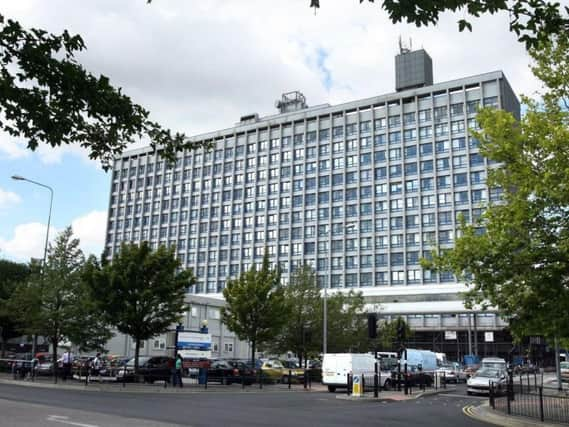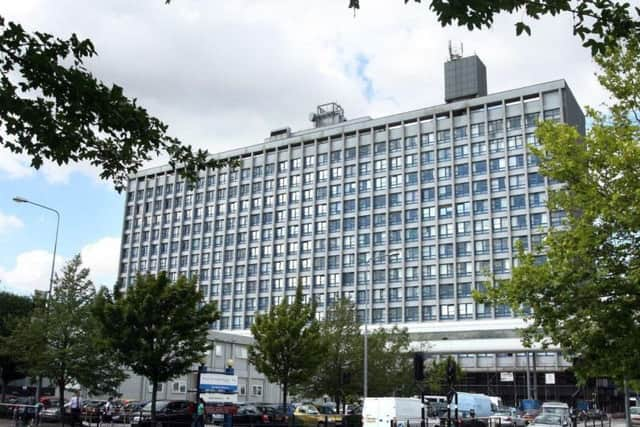‘Mountain to climb’ on accident and emergency waiting times as Hull ranks worst in Yorkshire


The Society of Acute Medicine, which represents doctors, nurses and paramedics in emergency departments, accused Boris Johnson of peddling "political spin" following unheeded warnings.
Also in news: Lord Lieutenant who was 'meticulous with safety' crashed helicopter in 'very challenging' weather conditions - inquest hears
Advertisement
Hide AdAdvertisement
Hide AdThe number of patients waiting more than four hours to be admitted to accident and emergency has risen more than a third in a year and is at a record high.


The number of patients seen after four hours was 275,526 last month compared to 208,083 the same month a year ago, an increase of 32.4 per cent, NHS performance statistics for England show.
A total of 436 patients waited more than 12 hours - 192.6 per cent higher than July 2018.
SAM president Dr Nick Scriven said: "This broken record has been playing for so long now that our warnings about the crises engulfing the NHS barely have any impact on those at the top."
Advertisement
Hide AdAdvertisement
Hide AdHe added: "This week demonstrates political spin is back in full swing under Boris Johnson's leadership, with massive funding announcements and talk of artificial intelligence while the issues on the ground remain unaddressed."
The longest waits in the region were at Hull NHS Trust, where 74.5 per cent of patients were seen within four hours, Northern Lincolnshire and Goole NHS Trust at 78.5 per cent and Bradford NHS Trust at 80.5 per cent.
Hull NHS Trust had the 12th longest waiting times in the UK.
A spokeswoman for Hull University Teaching Hospitals NHS Trust, said: “Like many other trusts, we are continuing to experience significant demand for services and our emergency department has seen record attendances in recent months.
Advertisement
Hide AdAdvertisement
Hide Ad“Our emergency department is also a major trauma centre, and the need to prioritise treatment for the most seriously ill and injured does regrettably, at times, mean some patients have to wait longer to be seen."
Also in news: Exclusive: London-style smart ticketing in the North could go ahead without major bus companies
Only three out of 119 reporting trusts with 24-hour accident and emergency departments achieved the 95 per cent standard set by the Government.
Tim Gardner, senior policy fellow at the Health Foundation charity, which aims to improve health across the UK, said: "The new Prime Minister has identified reducing NHS waiting times as one of his key priorities, but today's statistics show there is a mountain to climb.
Advertisement
Hide AdAdvertisement
Hide Ad"Hospitals are struggling to cope with the demand of emergency admissions which have continued to grow year on year, while people are waiting longer for planned surgery.
"The NHS has routinely missed the key 62-day cancer waiting time target for over five years, with delays in diagnosis playing a key role. If not adequately addressed, these ongoing pressures will increasingly impact on patients and the level of care that the health service can deliver.
"And it's not just about accident and emergency - sadly these figures show relentless pressure throughout the whole system.”
One problem area was waiting times for cancer treatment, which are at their longest in more than a decade.
Advertisement
Hide AdAdvertisement
Hide AdMr Gardner said: "More than one in 10 people on the list for planned treatment are now waiting over 18 weeks, the worst level since January 2009, and the key two-month cancer treatment target now hasn't been met in three-and-a-half years."
The NHS missed its target of 93 per cent of people with suspected cancer being seen by a specialist within two weeks of an urgent referral by their GP.
Some 90 per cent were seen by a specialist, and 76 per cent of people began treatment within 62 days in June, less than the 85 per cent target.
The number of patients waiting to start general treatment at the end of June was 4.4 million - a 4.6 per cent rise from the previous June and up more than a fifth since 2016.
Advertisement
Hide AdAdvertisement
Hide AdThe number of patients waiting more than 18 weeks rose from 502,000 in June last year to 601,000 - more than one in seven of the total.
Also in news: The 'zombies' of Wharram Percy: The story of the mutilated bodies found in a Yorkshire village
An NHS spokesman said: "Accident and emergency doctors, nurses, paramedics and other staff have pulled out all the stops to deal with the record heat and record number of attendees over July, treating the highest number of patients ever within four hours - and on average 2,300 more people a day within four hours than in June.
"At the same time, a record number of people have benefited from fast cancer checks or treatment for psychosis and eating disorders over the last three months, while millions more people have benefited from routine tests and treatments over the last year."
Advertisement
Hide AdAdvertisement
Hide AdNigel Edwards, chief executive of the Nuffield Trust, said: "The soaring temperatures in July have taken their toll on patients and staff, with a record number of people turning up to accident and emergency last month.
"The number of people waiting over four hours on trolleys to be admitted was also unusually high for summer at over 57,000 - a figure that would have once been unthinkable, even in the depths of winter."
This is the lowest percentage ever recorded during the summer months, hospital doctors union the Hospital Consultants and Specialists Association (HCSA) said.
HCSA president Dr Claudia Paoloni said the effects of pension tax changes had "undoubtedly" impacted on care, warning that waiting lists could hit five million people without reform.